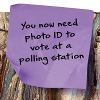Voter ID
Voter Authority Certificates and Anonymous Elector's Documents

This will apply at:
- Local Government Elections in England
- UK Parliamentary Elections
- UK Parliamentary By-Elections
- Recall Petitions
- Police, Fire and Crime Commissioner elections
Accepted Photographic ID
- a passport issued by the UK, any of the Channel Islands, the Isle of Man, a British Overseas Territory, an EEA state, or a Commonwealth country
- a driving licence issued by the UK, any of the Channel Islands, the Isle of Man, or an EEA state (this includes a provisional driving licence)
- a biometric immigration document
- an identity card bearing the Proof of Age Standards Scheme hologram (a PASS card)
- a Ministry of Defence Form 90 (Defence Identity Card)
- a Blue Badge
- a national identity card issued by an EEA state
- an Older Person's Bus Pass
- a Disabled Person's Bus Pass
- an Oyster 60+ Card
- a Freedom Pass
- a Scottish National Entitlement Card issued in Scotland
- a 60 and Over Welsh Concessionary Travel Card issued in Wales
- a Disabled Person's Welsh Concessionary Travel Card issued in Wales
- a Senior SmartPass issued in Northern Ireland
- a Registered Blind SmartPass or Blind Person's SmartPass issued in Northern Ireland
- a War Disablement SmartPass issued in Northern Ireland
- a 60+ SmartPass issued in Northern Ireland
- a Half Fare SmartPass issued in Northern Ireland
- an Electoral Identity Card issued in Northern Ireland
Why are certain Work/Student Passes and Railcards not accepted?
Work/Student Passes: Given the wide array of professional and educational organisations that provide photographic identification, it would not be difficult to create a form of identification for a non-existent organisation meaning these would be susceptible to fraud. However, some student cards are PASS accredited, and so would be accepted (e.g. the National Union of Students 'TOTUM' student card). All accredited PASS cards bear the Proof of Age Standards Scheme hologram.
Railcards: While a Railcard is considered a concessionary travel pass, the Government does not believe this would be an appropriate form of identification as it is insufficiently secure. Similarly, the 18+ Oyster card does not have a suitably secure application process for it to be used as photographic identification at polling stations (unlike the 60+ Oyster card, which has more rigorous processes).
Applying for Voter ID
Where an individual does not have or does not wish to use one of these accepted forms of photographic ID, they can apply for a Voter Authority Certificate. This is a document containing an elector's name and photograph which can be obtained free of charge from their local Electoral Registration Officer (ERO), following verification of an applicant's identity.
To apply for a Voter Authority Certificate please visit GOV.UK - Apply for a Voter Authority Certificate (opens new window)
If you need any help with applying for a Voter Authority Certificate or want to apply in person please contact elections@basildon.gov.uk (opens new window)
Anonymous Electors
Anonymous electors wishing to vote in person will also need to produce photographic ID. Due to their entry on the polling station register being linked to their electoral number, rather than their name, the only accepted form of photographic ID for an anonymous elector will be an Anonymous Elector's Document. This is a document containing an anonymous elector's elector number and photograph which can be obtained free of charge from their local ERO, following verification of an applicant's identity.
The Voter Authority Certificate and Anonymous Elector's Document cannot be used as proof of identity for any other purpose than for voting.
Further Information
For further information please visit Electoral Commission - Voter Authority Certificates and Anonymous Electors Document (opens new window)
The Electoral Commission have also produced a Voter Information Booklet that can be viewed here Electoral Commission - Voter Information Booklet - Voter ID - May 2023 (PDF, 1 MB)(opens new window)
